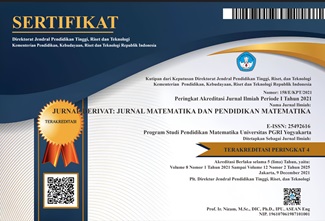Penerapan Model Guided Discovery Learning Dengan Mind Mapping Untuk Meningkatkan Kreativitas Mahasiswa
DOI:
https://doi.org/10.31316/j.derivat.v4i1.160Abstract
The aim of this research is to describe the application of guided discovery learning model with mind mapping that could increase students creativity in compiling the thesis proposal. The approach of this research is descriptive qualitative with the research subjects are 3rd-grade students of Mathematics study program of UMM that taking the Research Methodology course.
           The steps of this research are planning, implementation, analysis, and evaluation respectively. The Guided discovery Model Learning with Mind Mapping is applied at the implementation stage, where students are required to develop research proposals based on guided discovery learning steps, that is (1) provision of stimuli, (2) problem identification, (3) completion data, (4) data processing, (5) verification, and (6) generalizations, which have been compiled in textbooks of Research Methodology courses. The results of this research found that students have difficulties in determining the topic of research, the reference, and the types of research and instruments to be used.
Keywords: guided discovery learning, mind mapping, creativity
Keywords: guided discovery learning, mind mapping, creativityDownloads
Published
Issue
Section
Citation Check
License
Authors who publish with this journal agree to the following terms:
-
Authors retain copyright and grant the journal right of first publication with the work simultaneously licensed under a Creative Commons Attribution-ShareAlike 4.0 International License that allows others to share the work with an acknowledgment of the work's authorship and initial publication in this journal.
- Authors are able to enter into separate, additional contractual arrangements for the non-exclusive distribution of the journal's published version of the work (e.g., post it to an institutional repository or publish it in a book), with an acknowledgment of its initial publication in this journal.
- Authors are permitted and encouraged to post their work online (e.g., in institutional repositories or on their website) prior to and during the submission process, as it can lead to productive exchanges, as well as earlier and greater citation of published work (See The Effect of Open Access).







